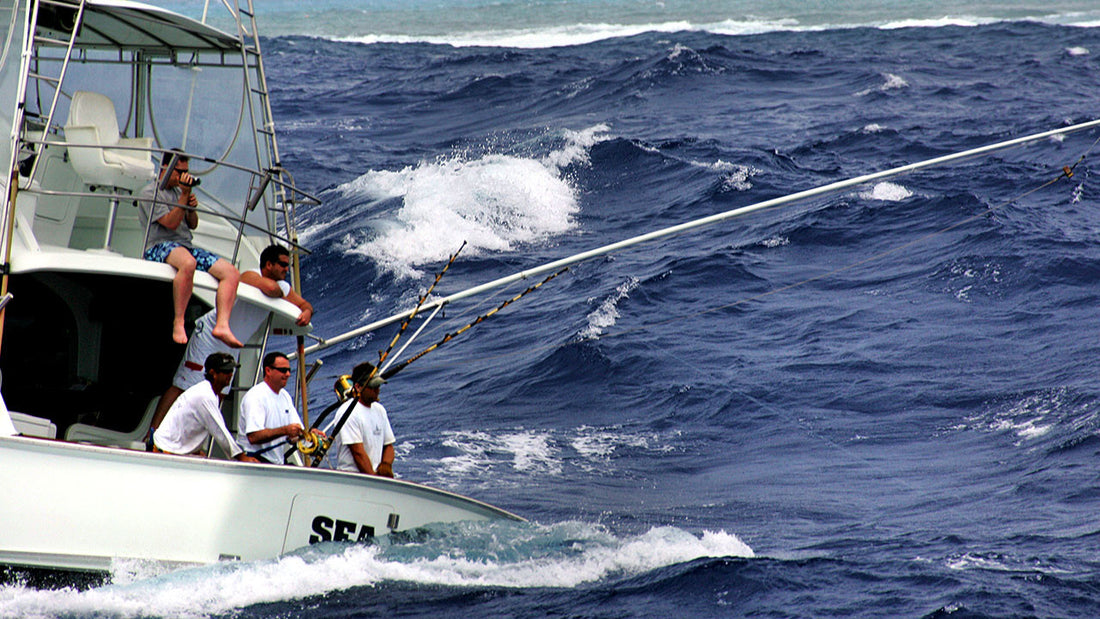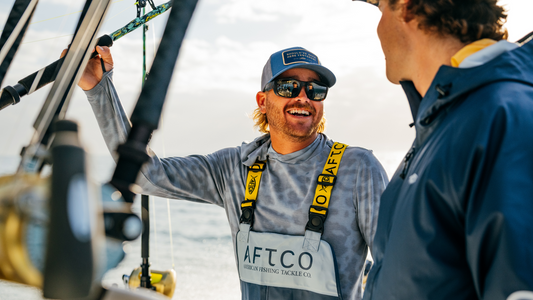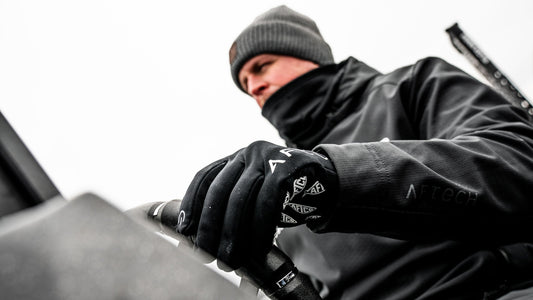
Can You Fish in Bad Weather Conditions?
Words by IGFA Hall of Fame Captain, Peter B. Wright
Weather forecast was predicted to be 25 - 30 knot winds as a strong high pressure system in the South Australian continent was beginning to build along Australia's Queensland coast. Over breakfast, our charter fishing guest looked at the white caps on the sheltered water behind the #5 ribbon reef and watched the booming ocean swell outside the reef crash onto the reef front.
"I don't think I want to go fishing today." he said. "I'd rather just lie around the mother boat and read." "You don't mind if we go, do you?" was my reply. "The boys and I have been waiting for this. Those tailers we saw yesterday should be just the start of it. Every black marlin in the Coral Sea will have tailed in against the reef overnight, and if they eat like the ones did yesterday it'll be the best day all year!" Our charter's friend and fishing companion/guest said he would like to join us if it wasn't a problem.
"As rough as it is, we won't be in any hurry." I told the crew. "Grab your fishing rain gear, a mid weight fishing sweatshirt and if it's good as I think we'll have all we need. If it's slow, we'll have more than we want—even with a late start."
Overnight, the swell built, but had time to get farther apart than the uncomfortable, short, steep chop of the late afternoon of the day before. Duyfken could rise with the large (12 foot plus) seas instead of crashing against the steep faces of yesterday's smaller, but far more nasty chop. By 1:30 PM, we were back at the motherboat having released 3 marlin and boated one well over 1,000 pounds. My mate had to lean out over the transom and knock vigorously on the motherboat's wooden hull to roust the sleepers inside to weigh our guest's fish of a lifetime. His richer but less adventuresome friend has still never caught a really big marlin, even though we went back out and released several more nice ones later that day.

Tips for Saltwater Fishing in Bad Weather
If the fishing grounds are close enough to a safe harbor or anchorage, we can fish in some truly bad weather conditions. In areas where we have to travel long distances to and from the saltwater fishing grounds, we usually stay in on days we would relish in a spot like Australia's Great Barrier Reef, where yards, rather than miles, measure the distance to the fishing grounds.
Even so, on poor weather days, special tactics are often required. On really bad days, with heaving decks, stand up fishing is a terrible idea. Trying to maintain balance while both hands occupied is challenging and dangerous. It can be safe to fish even the heaviest tackle from a well-built fighting chair, but foolish to try to stand up against the transom of a wave-tossed sport fishing boat. Even with an expert professional crew, it is the question of their safety while trying to stand up and handle a fish on a leader—which is often the main reason for canceling a saltwater fishing trip due to rough weather.
Trolling tactics also have to be modified to suit the difficult weather conditions. Forget all the "hocus pocus" about trolling lures on exact positions on the wake. Climbing the face of big seas trolling speeds will drop and rise with the waves. Down sea speeds can jump from 6 or 7 to up to 12 or 14 knots as we surf down the wave fronts. Our wake is changing all over the place and complicated calm water lure shapes are useless in the rapidly changing conditions. (Don't tell me to only quarter the sea - I am going to get in front of that tailing marlin or tuna regardless of whether it is upsea, downsea or directly in the trough!)
Forget staggered trolling patterns. On high wind days troll paired baits or lures of equal weight, equal distance behind the transom. They will be less prone to tangle each other when blown sideways. Trolling fewer baits in rough weather makes life easier and raises overall efficiency.
I always fight fish by chasing them in forward gear rather than reverse. This is especially important in big seas when backing up into breaking waves is down right dangerous (and STUPID). By motoring forward upsea and passing the fish, you reach a position where you can back up downsea in the final maneuver of the fight.
In the end it is the safety of the boat and her crew that dictates whether we spend a day off shore fishing or not and it is always better to error on the side of caution.







